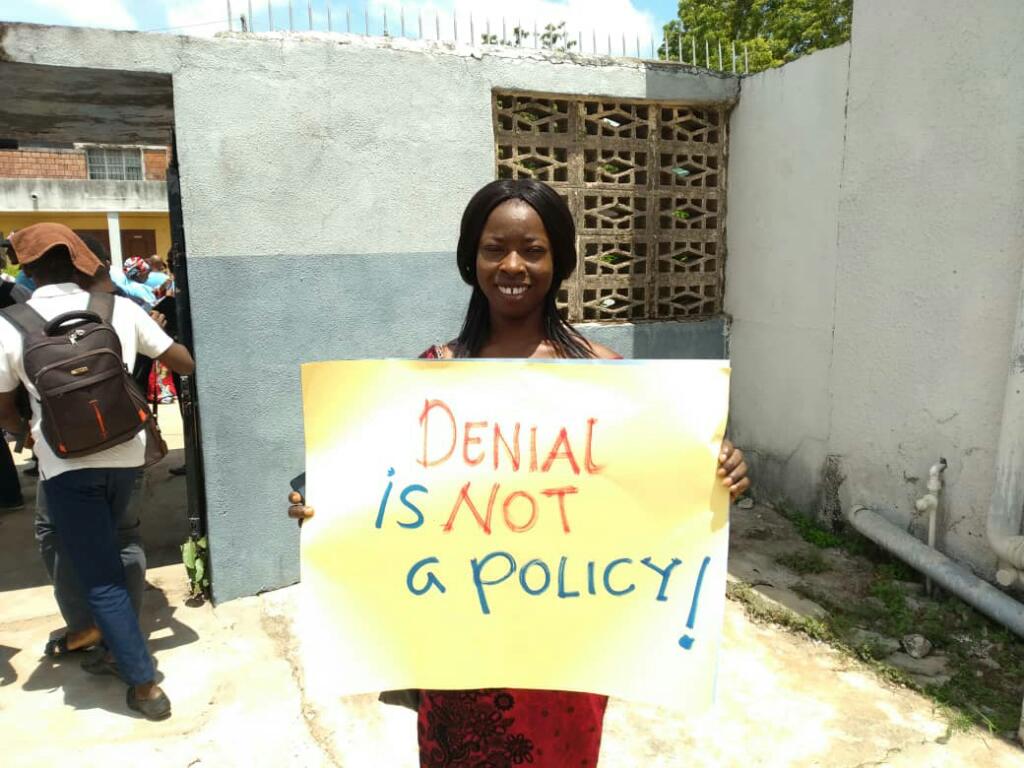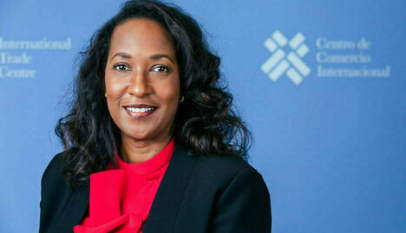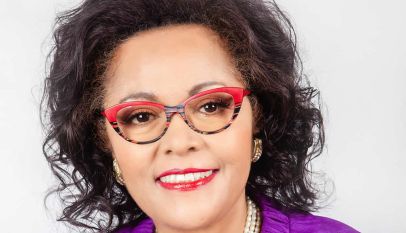INTERVIEW | My climate action campaign has just begun – Adenike Oladosu
“Today, in a site where deforestation has taken place for my 26 week of #FridayForFuture To draw my leader’s [leaders’] attention to this issues. You are not too old to standup for our planet-earth, you can still make a difference because our earth needs you while you are alive,” tweeted the handle @the_ecofeminist at 7:55am [Nigerian time] on May 31, 2019.

Underneath the tweet is an amateur footage of a slim, gap-toothed and dark-complexioned young woman clad in a black-and-red knee-level gown; standing on what appears to be a farmland. Still on the background, cone-shaped zinc roofed houses could be seen some five hundred meters away from her. She is holding a pink coloured cardboard paper with the message: “CLIMATE JUSTICE!!! WHEN DO WE WANT IT? NOW! NOW!! NOW!!!”
The owner of the twitter handle, whose picture also appears beneath the tweet, is Adenike Oladosu, a self-described ‘ecofeminist’ and climate justice activist. Oladosu is passionate about the environment hence detests climate change with even more craving than her adoration for the environment. Passion for the former and loathe of the latter was the twenty-five-year-old trained agricultural economist’s prime motivation for joining the #FridayForFuture movement.
Started in 2018, #FridayforFuture is a global climate action movement inspired by then fifteen-year-old Greta Thunberg, the Swedish girl who abandoned school for weeks to protest government’s inaction against climate change, at the Swedish parliament in Stockholm. “As youths, we are a powerful force and our actions can make a huge difference. Thus, I am calling on young people to come out en-masse and demand for urgent climate action from African leaders,” said Oladosu, a global climate strike champion based in Abuja, Nigeria`s capital.
Like Thunberg, Oladosu believes Nigerian leaders are not serious about climate change; saying reading the 2018 report of the Intergovernmental Panel on Climate Change (IPCC) was “disturbing to me; I have to take action because it is about my future and the future of other young people like me. We have to demand for urgent action from them. It is our right; we deserve to live in a healthy and egalitarian planet!”
According to the landmark report of the IPCC, the UN’s body responsible for assessing the science related to climate change, the global community has only 12 years to keep global warming at 1.50 C; otherwise, even a half degree increase in temperature will significantly worsen the risks of drought, floods, extreme heat, and poverty among millions of people across the world. The special report, titled: ‘Global Warming of 1.50 C,’ highlighted the impacts of global warming of 1.50 C above preindustrial levels, as well as the negative consequences of global warming on biodiversity, food security, natural and human systems.
It was the IPCC`s report which has been described as “the largest clarion bell from the scientific community” that inspired Oladosu to join the #FridayForForture movement. In March, this year, she mobilized over 800 youths from across three Nigerian states – Lagos, Kaduna, and Cross-Rivers – and the Federal Capital Territory to protest for climate action, on the occasion of the 1st Global Climate Strike Week. Through the campaign, she aimed to enhance the Nigerian public’s understanding of climate change, on one hand, and inspire the government to take action on the climate crisis, on another hand.
“We have less than 12 years from now to take immediate action on the climate crisis. If we fail to do so by 2050, we are heading to a path of no return – our species are in danger, food production will decline and it can result in famine. Climate change is like a time-bomb,” says Oladosu, an unrepentant optimist in the potency of youth-power in tackling climate change. “As youths, we are a powerful force and our actions can make a huge difference. Thus, I am calling on young people to come out en-masse and demand for [urgent] climate action from [African] leaders. It is happening all over the world, youths have the power to influence many things and make our leaders listen to us.”
If she is not leading climate action protests in Nigerian cities, Oladosu could be found engaging rural dwellers in communities not very far away from Abuja: educating them on the dangers of indiscriminate falling down of trees and bush burning to the environment as well as the consequences of climate change. “I found that many people including university graduates didn’t know what climate change was about; after I engaged them they were able to understand that climate change was real and happening.”
Although Africa contributes a mere 4% of global carbon emissions, global warming remains a major threat to life on the continent with devastating negative consequences on natural and human resources hence the need for African leaders to take urgent action against the climate crisis including living up to commitments they signed on to under the Paris Agreement. Africa must begin to build climate-resilient communities and sustainable agricultural food systems.
“Most African leaders have signed the Paris Climate Agreement; now it is time for our leaders to back up their commitments with urgent actions. Most times, our leaders don’t take immediate actions – not until things have gone beyond control. As the days pass by, we are approaching 2050 – a point of no return – and the elastic limit of climate action. We must act now!” averred Oladosu, for whom, the fight for climate action has just begun!











